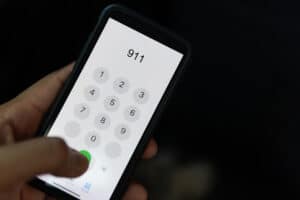What Are California’s False Reporting Laws?
California has three separate false reporting laws. If you violate any of the three laws, you may face jail time, fines, or probation. These crimes can be committed by providing law enforcement with untrue information, whether about an event that actually happened or one you made up. The three false reporting laws in California involve making false reports of an emergency, a fire, or a crime.
Criminal Reporting a False Emergency
The first of California’s three false reporting laws involves falsely claiming there is an emergency. It is only a crime if you intentionally make a false report of an emergency. So, if you genuinely believed something required an immediate response when in reality it did not, you did not commit a crime.
Generally, you have to report an emergency to law enforcement for the falsity to be a crime. However, screaming in public about a purported situation can also lead to legal consequences if it causes people to react and leave an area.
In California law, “emergency” is defined as:
- A situation requiring the response of an emergency vehicle, like a police car, fire truck, or helicopter.
- Any activation of the state’s Emergency Alert System.
- Any activation of an AMBER alert.
- A situation requiring people to evacuate an area, dwelling, office, car, or building.
Therefore, if you call the police and falsely claim someone took your child, activating an AMBER alert, you falsely reported an emergency. Similarly, if you are at a baseball game and cause the bleachers to empty because you were yelling about an (imaginary) swarm of bees, you may have committed a crime.
Making a false report of an emergency is punishable by up to a year in jail and a $1,000 fine. It is always a misdemeanor unless someone was significantly injured as a result of your false report. Then, it can be charged as a felony with a prison sentence of up to three years.
Making a False Fire Alarm
California’s second false reporting law refers explicitly to fires and fire alarm equipment. It is a crime to tamper with or break fire protection equipment or falsely pull a fire alarm. You can also be charged if you make a false report of a fire in progress.
Fire protection equipment includes fire alarms, smoke detectors, fire extinguishers, and fire suppression systems/sprinklers in buildings. If you destroy or tamper with any of these items, you can face criminal charges.
You can also be charged with a false report if you willfully trigger a fire alarm while knowing there is no fire. So, the classic schoolyard prank of pulling the alarm to get out of a test would violate this law. It is also a crime to call in the false report of a fire.
Violating any of the fire reporting laws is a misdemeanor punishable by up to a year in county jail and a $1,000 fine.
Falsely Reporting a Crime in California
California’s third false reporting law deals with making unsupported criminal accusations. It is illegal to knowingly make a false report of any misdemeanor or felony to an authority. You can be charged for making a false report if you call the police yourself or if you give a false statement during a law enforcement investigation.
In California, “authority” is defined as including:
- Police officers
- State troopers
- 911 dispatchers
- Prosecutors
- Grand Juries
So, if you report to the police your laptop was stolen when you know you just lost the computer, you may have committed a crime. Making a false report of a crime is always a misdemeanor, with the maximum penalties including six months in county jail and a $1,000 fine.
If you face charges under the false reporting laws in Anaheim, California, Chambers Law Firm can help. Contact us today at 714-760-4088 or dchambers@clfca.com to set up a free initial consultation.





